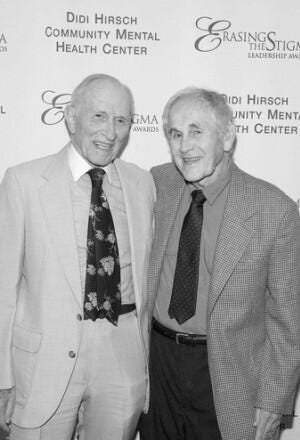Happy Saturday!
We’ve got a new one for you.
On this week’s episode, a listener’s brother dies by suicide, and afterwards, she finds herself angered by trigger warnings about suicide. She wants to know — are these actually helping other people? Or is it just something we do because we think we’re supposed to?
I really enjoyed getting the chance to learn more about all this. I feel like, we went in with a question about trigger warnings, instead, we learned a lot about human nature. How we react to painful information, how we tell stories that hurt or heal, how strange we all are in how we move past things or don’t.
Some meager thoughts on suicide prevention
We talk about suicide in the piece. I mention that the CDC has guidelines for how reporters, and, in my opinion, anyone on the internet could discuss this topic with care. They suggest, and I’m happy to follow their suggestion, that we mention that if you’re having a difficult time with sucidal thoughts or know someone who is, you might call a hotline. In the US, the number is 988.
Also, please, if you’re struggling and you can, find a psychaitrist. If you can’t, find any mental health professional. And if that’s not possible, just talk to someone you trust.
Robert Litman co-founded the first suicide prevention center, in Los Angeles, in 1958. His center created the first 24-hour suicide hotline. I think it’s fair to say he thought more about the mysteries of suicide than most. Why some people do it, and others don’t. Here’s something he had to say about that:
“For every hundred people at high risk, only three or four will actually commit suicide over the next couple years...It's like a slot machine...You can win a million dollars on a slot machine in Las Vegas, but to do that, six sevens have to line up on your machine. That happens only once in a million times. In a sense, it’s the same with suicide.”
He’s referring here to the idea that any given suicide, or suicide attempt, will happen because of a mix of variables. Maybe a propensity for depression interacts with a drug habit, the person gets hit with some very bad news, and it all happens during a time where for some reason, they’re isolated from their community and without good psychiatric support. That’s only five sevens, but, imagine some sixth.
For the act itself to occur, everything has to go wrong at the same time.
I think there's something hopeful about seeing things that way, because it suggests that to make someone safe, you don’t have to immediately change everything. Only a few variables need to be improved to get someone out of a danger zone.
Anyway — I’m sure some of you have dealt with this. Either suicidal ideation, loss of loved ones, or just the garden variety struggles of being a person who feels. If there’s stuff you’ve read that has helped, or preferred coping mechanisms, please share them in the comments. It’ll be nice for everybody, I think.
Oh, one last thing
In the story, we mention something called the Papageno effect, named after a character in Mozart’s opera, The Magic Flute. Garrott Graham, producer of Search Engine, insists I share this with you:
So silly. Okay, we will be back next Friday with a new one, it’s a technology story about a website I could not believe exists.
As always, if you want to support the work we do here, head over to searchengine.show. There, you can sign up for the ad-free version of Search Engine, which includes bonus episodes.
See you next week,
PJ






My father killed himself when I was five and a half. I have also been suicidal, or -ish.
Things that make me want to run away to the bathroom stall where I used to hide in high school:
--the other day when someone told me her dad was researching a used car for her "as only a dad can"
--the ads a brewery near me runs every Fathers Day for dads to come get a free beer (I'm also a full-time single mom. Every year after I get over the initial trigger I go down there and tell them I want my dad beer. Then I cry all over again)
--A children's book called When the Wind Blew (which is about an old woman and a kitten and has nothing to do with fathers or suicide at all)
--Anytime someone says "there's really only a five-minute window in which someone will kill themselves" or "most suicides are preventable" or whatever.
So basically (with the exception of the last one) really no story that comes with a suicide trigger warning--like the listener in the episode, it's only the stuff no one could predict.
I do use content warnings in communities where I post things and that's the norm--I don't think their ineffectiveness or inability to cover all the things is a reason for me to be a jerk about it--but I appreciate this episode for identifying and validating some of my feelings in ways that haven't happened before.
I don't know that I have any advice, except that maybe I should have taken the trip to some hot springs that I thought would save my life in January, because it can't have been more expensive than my $6205.07 inpatient stay a month later and it would have been a lot nicer. But who knows.
Great episode. It was very interesting produced with such care.